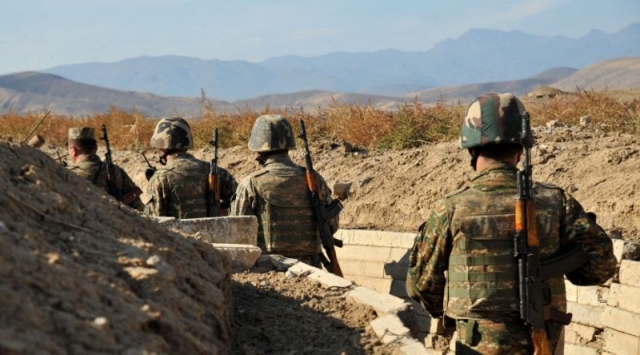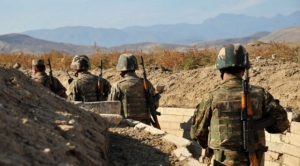UPDATE: Heavy Fighting Erupts in Nagorno-Karabakh
UPDATE: (16:58 GMT+4, 3 April)
- Azerbaijan’s defense ministry has announced a unilateral ceasefire in accordance with the requests of the international community.
- Armenian military spokesman Senor Hasratyan denies the claim, saying Azeri forces continue using Grad rockets and heavy artillery to shell the northern Karabakh area of Martakert.
- AFP reports Fierce fighting continues on south-eastern and north-eastern sectors of the Karabakh frontline.
- Azerbaijan’s defense ministry claims significant frontline gains along the line of contact, including the capture of two villages and a stretch of strategic high ground previously controlled by Armenian forces. Armenia has forcefully denied the claim.
- Armenia’s Defense Minister David Tonoyan said in a Sunday afternoon press conference that Yerevan is ready to order a full-scale military intervention in Nagorno-Karabakh if the situation deteriorates further.
- Armenian President Serzh Sargsyan confirms 18 soldiers were killed and 35 wounded in Saturday’s clashes.
- Azerbaijan’s defense ministry released a statement confirming 12 soldiers were killed in Saturday’s clashes and a Mi-24 helicopter was also shot down.
- Unsubstantiated reports by both Armenian and Azeri sources claim that each side has suffered higher casualties than reported.
- Russian Defense Minister Sergei Shoigu has spoken with his Armenian and Azeri counterparts - Seyran Ohanyan and Zakir Hasanov - by phone in an effort to calm the situation.
- Azeri President Ilham Aliyev released a statement early Sunday, saying Azerbaijan will halt its combat operations in favor of a peaceful settlement to the conflict.
- The OSCE Minsk Group, which has been mediating the conflict since 1994, expressed concern over the large-scale cease-fire violations that are taking place along the Line of Contact in the Nagorno-Karabakh conflict zone. The organization strongly condemned the use of force and loss of life.
- EU foreign policy chief Federica Mogherini has called on the parties to immediately stop the fighting and observe the cease-fire.
- Azeri Foreign Minister Elmar Mamedyarov discussed the on going situation by phone with German Foreign Minister Frank-Walter Steinmeier
- Turkish President Recep Tayyip Ergodan has phoned his close ally, Azerbaijan’s President Ilham Aliyev, offering close diplomatic and military support.
- OSCE Minsk Group ambassadors - Igor Popov of Russia, James Warlick of the US, and Pierre Andrieu of France - issued a joint statement condemning the outbreak violence.
- Armenian paramilitary organization Yerkrapa, a 10,000 strong volunteer group made up of veterans of the 1992-1994 Nagorno-Karabakh War, has called on the Armenian defense ministry to allow them to be deployed to the front.
- Azeri Defense Ministry press office reports huge numbers of war veterans from the 1992-1994 war are reporting for active duty, volunteering for frontline assignments.
- Belarusian President Alexander Lukashenko has called on both sides to halt the fighting, and has offered to act as a mediator in the conflict.
- French President Francois Hollande has called for an immediate end to the hostilities and for dialogue to begin.
YEREVAN - Intense heavy fighting broke out in the early hours of Saturday morning along the internationally monitored contact line separating Armenian and Azeri forces in the disputed South Caucasus region of Nagorno-Karabakh.
Armenian media outlet Azatutyun said that attacks by both parties escalated steadily over the course of the fighting at three points on the contact line, but that de-escalation appeared to be taking place by mid-afternoon.
Each side reported a growing number of casualties throughout the day as they deployed heavy weapons, as well as forward operating and special forces units, and rotary-wing aircraft to the combat zone.
Unconfirmed early reports indicate that Azerbaijan’s forces lost two helicopter gunships, three tanks, two unmanned aerial vehicles and an unaccounted number of casualties in the fighting,
Officials in both Armenia and Azerbaijan were quick to blame each other for the sudden uptick in fighting.
Armenia’s Defense Ministry spokesman Artsrun Hovhannisyan sharply accused Azeribaijan of launching an unprovoked coordinated ground offensive against Armenia’s forces, saying the Azeri military used warplanes, tanks and artillery to try to make inroads into Nagorno-Karabakh.
Military officials in the Azeri capital, Baku, quickly countered Armenia’s claims, saying its frontline forces had suddenly come under intense fire from mortars and high caliber grenade launchers before the Azeri Army was forced to take urgent measures to respond.
Vagif Dargyakhly, a spokesman for Azerbaijan’s Defense Ministry, told the Associated Press that more than 120 artillery rounds were fired early Saturday, some of which hit civilian residential areas.
Yerevan has confirmed that "casualties, civilian and military, have occurred on both sides" and that the fighting had rapidly intensified.
Armenia called the escalation the most serious incident in the conflict since a ceasefire ended the initial phase of hostilities 22 years ago.
Yerevan has demanded that the international community urgently intervene and launch an immediate effort to resolve the conflict.
Russian President Vladimir Putin’s spokesman, Dmitry Peskov, said Saturday afternoon that Moscow has called on both sides to implement an immediate ceasefire and exercise restraint.
US President Barack Obama has yet to release a statement, though the fighting comes only one day after Vice President Joe Biden met with Armenian President Serzh Sargsyan and Azeri President Ilham Aliyev, urging them to peacefully settle the conflict.
Turkish President, Recep Tayyip Erdogan, Azerbaijan’s staunchest ally, has yet to weigh in on the escalation. Erdogan has long accused his nemesis, Putin, of intentionally cratering peace talks in order to strengthen his influence on Russian ally and Turkey’s arch-enemy, Armenia.
Troubled Recent Past
Landlocked Nagorno-Karabakh, an ethnic Armenian exclave whose name loosely translates as "mountainous black garden", is surrounded by Azerbaijan. It has been under Yerevan’s control since a bloody two-year separatist war that killed an estimated 40,000 people and left more than a million as refugees ended in 1994.
Placed within the boundaries of the Azeri SSR by Soviet leader Joseph Stalin in an attempt to suppress nationalism in the Soviet Union’s titular republics, Nagorno-Karabakh became a flashpoint for ethnic violence in the final years of the Soviet Union.
Armenians, who made up more than 80 per cent of the pre-war population, attempted to wrestle the region back from Azerbaijan in the late 1980s during Soviet President Mikhail Gorbachev’s liberalizing glasnost and perestroika periods.
The Christian Armenian population claimed they were subject to a growing number of discriminatory policies enacted by the local Muslim Azeri minority, who then dominated the local police and Communist Party apparatus.
Deadly clashes broke out between the communities in 1988-1991, reaching its peak in February 1988 when Azeri mobs killed at least 26 Armenians in Sumgayit, a drab Soviet industrial city outside Baku.
The incident caused mass civil unrest in the city and later forced Gorbachev to send units of the army as well as Soviet MVD interior ministry troops into the city to quell the violence.
As the Soviet Union imploded, open warfare broke out between the two communities in late 1992.
Allied to Russia and heavily supported by volunteers from its vast diaspora in the West, Armenia’s superior forces quickly overran and routed Azerbaijan’s poorly trained, Turkish-supplied army in 1992-1993.
An uneasy ceasefire brokered by Russia, the US and France in 1994 left Nagorno-Karabakh under Armenian control, but years of wildly unsuccessful negotiations headed by the Organization for Security and Cooperation in Europe has left the tiny mountainous region a highly militarized breakaway separatist state, with its status still in limbo.
By Karen Tovmasyan
Edited by Nicholas Waller
Photo from Associated Press












